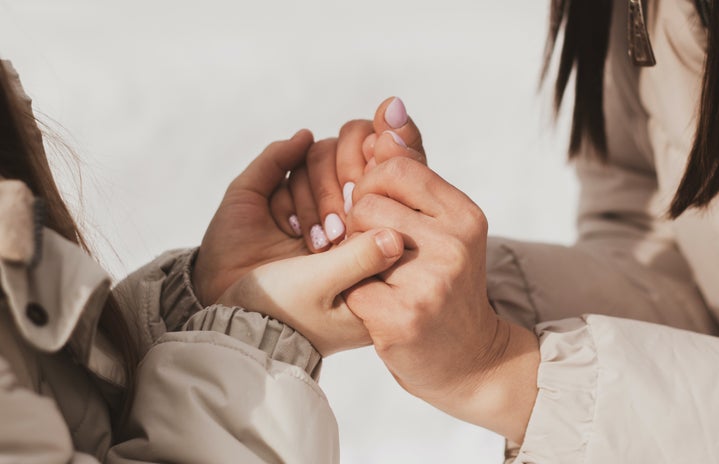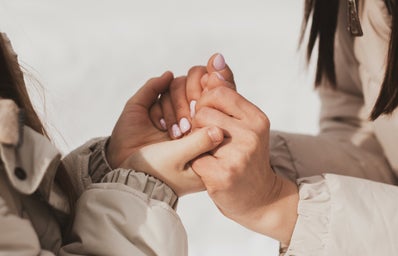In the days leading up to the start of this semester, I was not excited about coming back.
I felt a growing sense of unease, anxiety and sadness as it approached, and I wasn’t entirely sure why. The thought of starting up again, especially when one of my closest friends was going to be abroad, made my stomach turn.
The night before the first day I was a disaster, but I spent the evening with my best friend. We sat on the edge of her bed in silence for a few minutes, her arms around me and my head on her shoulder while I cried, breathing together. We ate dinner on her bedroom floor, and after, we watched a movie we’d been meaning to watch together for ages: “Frances Ha.”
I love this movie. It is a love letter to female friendships and chronicles the ways they evolve and the pain of falling outs. I highly recommend it.
There is a scene in the film where Frances says to her best friend Sophie, “Tell me the story of us.” They go on to describe their dream lives: from careers and lovers to vacation homes in Paris and honorary degrees. Watching this moment, two women who love each other sharing their aspirations and plans to spend their lives together, with one of the people I love most in this world meant so much to me — to both of us.
In one of my classes this semester we have been reading Rebecca Traister’s “All the Single Ladies: Unmarried Women and the Rise of an Independent Nation,” and one of my favorite parts of the book is the chapter “Dangerous as Lucifer Matches: The Friendships of Women.”
Ask anyone today what they would look for in a marriage, and you’ll probably hear answers involving companionship, stability, love, etc. However, the idea that marriage is a place where you can expect to find any of those things is a relatively modern one. The 20th-century marriage is an economic and social institution, not typically a place for companionship.
For centuries, friendship has been a strong pillar in the lives of women. It is a primary relationship, an essential source of emotional, and often also physical, intimacy and connection. Friendships have long been safe spaces, a haven that relationships with men, specifically romantic heterosexual partnerships, have historically failed to provide.
A remarkable example of this that Traister discusses is the friendship of Aminatou Sow and Ann Friedman. The two women met at a “Gossip Girl” viewing party in 2009 and quickly became close, their friendship now spanning over a decade.
Ann has cited her friends, most importantly Aminatou, as her “everything,” and Aminatou has said, “I always tell Ann she’s the single most important relationship in my life, not to put pressure on her, but because it’s true. It feels like I’ve known her forever.” When Ann moved away for work a few years later, the separation was devastating for both of them.
When a romantic partner gets a new job opportunity, there is at least some discussion about whether or not you will move with them. The same cannot typically be said for friendships despite the fact that they are the most important relationships we have. Being separated from a best friend can be a grieving process.
It’s important to point out that friendship, like any relationship, isn’t all rosy all of the time and requires commitment and effort in order to be healthy and functional. For much of “Frances Ha,” Frances grapples with the pain of growing apart from her best friend of almost 10 years as their lives begin to diverge. Aminatou and Ann tried not to let six weeks go by without seeing each other.
Their friendship remains long-distance, but their bond hasn’t faded. In 2020, they published a book titled “Big Friendship: How We Keep Each Other Close,” making the argument that, “A close friendship is one of the most influential and important relationships a human life can contain” and exploring what goes into making a friendship last.
They also hosted a podcast together from 2014 to 2022 called Call Your Girlfriend!
Investing in friendships is what makes for an emotionally fulfilling life. Romantic partnerships, no matter how healthy and loving they are, cannot and haven’t ever been able to fulfill every single need. Friendships are love stories just as much as partnerships are.
I recently broke things off with a guy I had gone out with twice because of an upsetting comment he made. I had talked to friends multiple times for confirmation that I wasn’t making a big deal out of nothing, but after ending things I felt like I was losing my mind!
I started thinking that maybe that was the wrong thing to do because what he said wasn’t “that misogynistic.” He was well-intentioned, and even the most well-meaning men are going to mess up sometimes. I called my younger sibling crying because I suddenly convinced myself I was being overdramatic, and they assured me I was not — “Always go with your gut instinct.”
I don’t doubt that this guy was kind and meant well, but I also don’t regret my decision. Even though it often doesn’t appear so, you are never under the obligation to educate or accommodate the shortcomings of men in your life.
In the context of romantic and sexual relationships, maybe this is much easier for me to say as a queer woman (not to say that queer relationships can’t also be toxic), but no matter who you are, there is so much more than a partnership full of accommodations on your end waiting for you.
My friends are the best people I know, and I am so lucky to be so emotionally fulfilled by my friendships. I’m not missing anything, I don’t know what I’d do without them. At this current moment in my life, I feel as though I could be content living in a commune with them and dying a spinster.
Romantic and sexual relationships can be lovely, and most of us have romantic and sexual needs and desires, but they are not the only places we find emotional fulfillment. Friendships between women have proved this to be true for ages.


